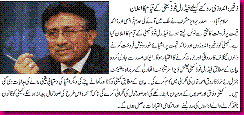 KARACHI: President Pervez Musharraf on Monday said that terrorism and extremism pose a big threat to the country and reiterated the resolve to root out the menace.
KARACHI: President Pervez Musharraf on Monday said that terrorism and extremism pose a big threat to the country and reiterated the resolve to root out the menace.
He was addressing an unveiling ceremony of plaques of the already operative Pakistan Steel flyover on National Highway in Quaidabad and the planned Bin Qasim Industrial Park, which was arranged in Pakistan Steel Mills.
The President said the country was facing three major challenges - sustaining GDP growth at 7 percent, smooth transition of power to a new elected government, overcoming extremism and terrorism.
He said it was imperative to sustain the GDP growth rate at 7% or 6%. Otherwise, he said the country would become economically weak once again.
"I would not allow the reversal of the economy," he vowed.
Sindh Governor Dr. Ishrat-ul-Ebad Khan, Caretaker Chief Minister Justice (Retd) Abdul Qadir Halepota, Caretaker Federal Information Minister, Senator Nisar A. Memon, Caretaker Minister for Industries, Production and Special Initiatives Salman Taseer, Caretaker Defence Minister Saleem Abbas Jillani, City Nazim Mustafa Kamal besides a large number of Pakistan Steel employees and leading businessmen attended the ceremony.
President Musharraf said the second challenge for the nation was to put the country on a democratic path and the people would have to resist all those engaged in de-railing the democratic process.
He said through free, fair, transparent and peaceful elections the power would be transferred to a new government and this democratic process would strengthen further with the passage of time.
"Insha Allah, these elections would be peaceful," he asserted.
The President said this was a serious challenge to the country and the nation would have to fight this menace jointly and boldly.
He cautioned that we have to succeed on all the three fronts otherwise the country would not be stable and would not prosper.
The President said it was very regrettable to note that after the assassination of Mohtarma Benazir Bhutto, anti-social elements resorted to looting, arson of banks, shops and vehicles, and violence, especially in Sindh province and caused loss of billions of rupees to the country as a whole.
President Musharraf said the mayhem badly affected the economy of the country and undermined confidence of the investors.
Some reports suggest that this hostile activity was planned and calculated one, he said that if this was true it would be highly regretful for the entire nation.


